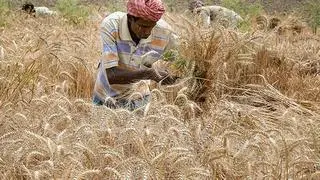Tax on agriculture has generally been discouraged in India, and this was mostly factored into while framing the broad parameters of the Goods and Services Tax (GST) law.
The GST Bill, passed in the Lok Sabha on March 29, provides that “an agriculturist, to the extent of supply of produce out of cultivation of land, shall not be liable to register under the GST”.
Hence, the question arises as to who is an “agriculturist”, said Sherry Oommen, Head, Tax and Corporate Laws, of Kochi-based Nash capital Partners.
The Bill defines the term to mean ‘an individual or a Hindu Undivided Family (HUF) who undertakes cultivation of land (a) by own labour; or (b) by the labour of his family; or (c) by servants on wages payable in cash or kind or by hired labour under personal supervision or the personal supervision of any member of the family.’
It appears that the GST Council invested substantial time to redraft this definition several times to ensure that only specific categories of ‘persons’ are covered under the scope of ‘agriculturist’.
The earlier draft of the Model GST Law had defined the term to mean ‘any person’. This has now been restricted to ‘an individual or an HUF.’
Based on the current draft of the GST Law, it appears that only those agricultural activities meant for ‘raising of crops’ could be considered as an activity of ‘cultivation of land’, Oommen said.
Does it mean that all those individuals and HUF involved in activities such as sericulture or poultry cultivation may not be considered as agriculturists?
This might not be the real intent of the government, Oommen said, although the literal interpretation of ‘cultivation of land’ appears to be extremely narrow as compared to ‘agriculture.’
Verbal assuranceFinance Minister Arun Jaitley had given a verbal assurance in the Lok Sabha about exempting the agriculture sector, including the dairy and poultry industry, from GST. Express provisions in the final GST law could have helped. One needs to wait for the exemption list to understand the implications for agriculture and related sectors such as sericulture, poultry and dairy.
Definition is keyIt would also be rather prudent for the government to define ‘cultivation of land’ and settle this matter once and for all.
Now, would agriculture be indirectly taxed?
Section 9(4) of the GST Bill clearly states that any registered person who purchases goods/services from a person ‘who is not registered’ (in our case an agriculturist, who is non-taxable) will have to deposit tax on ‘reverse charge’ basis. On an economic rationale, the whole benefit of being an ‘agriculturist’ will be negated if registered persons have to eventually pay tax on a reverse charge basis on purchases made from him.
Thus, unintentionally, the government might be disincentivising registered persons from buying produce from an unregistered agriculturist. It may want to reconsider section 9(4) to protect the interest of an ‘agriculturist,’ Oommen said.
Finally, with the changing economic scenario, the agricultural sector has also been evolving. Farmers are using high-tech machinery and technologies in agriculture, and getting more and more organised by the day.
By limiting the scope of agriculturist only to individual/HUF, the government might be working against the prospect of greater organisation of the agricultural sector, Oommen said.








Comments
Comments have to be in English, and in full sentences. They cannot be abusive or personal. Please abide by our community guidelines for posting your comments.
We have migrated to a new commenting platform. If you are already a registered user of TheHindu Businessline and logged in, you may continue to engage with our articles. If you do not have an account please register and login to post comments. Users can access their older comments by logging into their accounts on Vuukle.